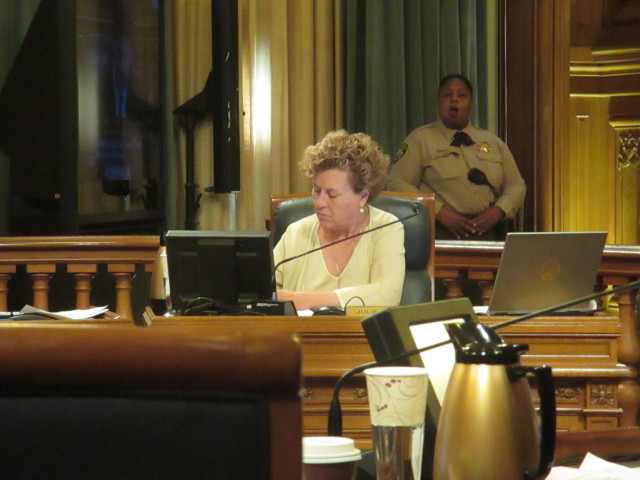Critics say D3 Sup does the impossible: She makes a bad law worse

By Tim Redmond
JULY 15, 2015 – Sup. Julie Christensen introduced amendments that made a bad law worse, and the supervisors yesterday passed a set of rules that will make it easier for landlords to take rental housing off the market and turn it into hotel rooms.
It was a stunning display of obeisance to the corporate overlords of tech – and will likely fuel the campaign for a ballot initiative to limit short-term rentals, which has just qualified for the ballot.
There were two proposals before the supervisors, and they were profoundly different.
The measure by Sup. David Campos would have required hosting platforms like Airbnb to make sure that every unit they list complied with local law. The competing measure, by Sup. Mark Farrell (with Christensen’s amendments) would shift the responsibility completely off the corporations and onto the city and the people hosting visitors.
The city planners have long insisted that they can’t enforce the law unless they get the data from the hosting platforms that Campos wanted to require.
Farrell and Christensen said that the city, which has been utterly unable to enforce existing law, could do a better job with a new enforcement office – and that hosts, some of whom have blatantly disregarded the law for years, will start telling the city how often they are renting out units.
Campos started the debate by noting that the current law, sponsored by former Sup. David Chiu (and written in part by Airbnb) isn’t working. Citing the Chron’s report on short-term rentals, he pointed out that scarce rental housing is being turned into hotel rooms all over town. His bill, he said, would cut the number of short-term rentals by 27 percent – and most of those would be the places where landlords have turned residential property into commercial hotels.
Farrell also acknowledged that the current rules aren’t working, and said it was time “to get this law right.” He said that a ballot initiative is the wrong way to address an evolving and fast-changing technology.
But what he offered won’t address the main concerns that drove so many people to sign the initiative that will appear on the November ballot.
His measure would limit short-term rentals at any unit to 120 days a year – but would rely on the city and neighbors to be vigilant enough to make sure nobody’s cheating. His measure has no mandates that the hosting platform either block unregistered listings or tell the city how many days a unit is rented out.
Sup. Norman Yee, who represents the West of Twin Peaks area, proposed an amendment that would require the city to notify neighbors within 300 feet if a property owner filed an application to be a short-term rental host. That rule would have applied in most residential areas.
Sup. Malia Cohen challenged Yee, asking why he had proposed such a broad plan, instead of limiting it to the few parts of town that have single-family detached houses. His proposal was defeated 6-5 – in the first of a series of votes that went exactly the same way.
Christensen made a remarkable statement, given that the entire reason this was before the board is that most people agree the current law has failed. She praised Chiu for his work, and said that the law “is not broken, but is not fully implemented.”
She said “it takes a while to establish a process.”
And while that is happening, of course, the evictions continue.
She moved to eliminate the 120-day cap that Farrell had proposed, and replace it with the existing rules, which allow pretty much unlimited short-term rentals as long as the host is at home.
There is, most agree, no way to enforce that without spying on every one of the 5,000 or so STR units in the city to see who is living there when.
But no matter: She pushed for that, and then asked that the hosts be the ones who have to file quarterly reports on how many nights they are renting out their apartments.
Campos was stunned. “Sup. Christensen’s proposals do what I didn’t think was possible,” he said. “They have made the Farrell/Lee proposal much worse.”
The amendments, he said, “shift responsibility to the hosts.” He compared it to a rule that would put the onus on hotel guests, not the hotels, to collect and pay the city’s hotel tax.
“This is an unprecedented step,” he said. “You are turning your back on the hosts to protect a $23 billion company.”
But never mind: This deal was done.
The Christensen amendments were adopted, 6-5, with Sups. London Breed, Christensen, Malia Cohen, Farrell, Katy Tang, and Scott Wiener in support.
The Campos bill went down by the same margin.
The Farrell measure was adopted, again 6-5.
“This is stunning,” Calvin Welch, one of the people who organized the initiative campaign, told me after the meeting. “If you believe that coal is clean, then you can believe that this is regulation.”
I understand Farrell’s concern — this is a complicated area of law, and it would be nice if the board could carefully craft working regulations. But apparently the mayor and the Airbnb lobbyists have made sure that won’t happen. So now the voters will have their say.





